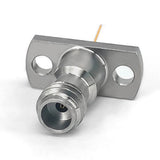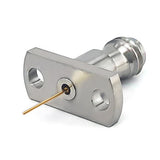2穴フランジ付き1.0mmメスコネクタ、PCBマウント、DC-110GHz
部品番号リスト:
| 1.0-KFD1407 | 1.0mm メス 2 穴フランジ、ステンレス鋼 |
仕様:
| 頻度 | DC-110GHz |
| 挿入損失 | ≤0.05 xSqt.(f_Ghz) |
| VSWR | 1.5 |
| 本体材質 | ステンレス鋼 |
| 取付方法 | 2穴フランジ |
| フランジサイズ | 10.16mmX4.57mm _ |
| 穴の間隔 | 7.11mm |
| 穴のサイズ | 1.7mm |
| 動作温度 | -40℃~+165℃ |
オススメ商品
FAQs
What is a 110GHz connector and its application?

The 110GHz Connector is primarily used in ultrahigh frequency applications like millimeter wave communication and advanced test environments. It provides high precision to gain minimum signal loss, which contributes to cutting-edge technologies in aerospace, defense, and telecommunication.
How does the 110 GHz connector compare to other connectors?

110GHz Connectors are more efficient as compared to connectors with lower frequency operations since they conduct ultra-high frequencies without extra signal loss. They apply where high precision and reliability need to be reached, especially where data rates are high and bandwidths must be met.
What Factors Should Consider When Selecting a 110GHz Connector?

When choosing an appropriate 110GHz connector, use a frequency range of material durability and match the system. The connector chosen should fulfill the demanded needs of your application, such as insertion loss and return loss as well as environmental durability.
What is a 110 GHz connector?

110 GHz is a high-frequency component, used in signal transfer, with a very high frequency ranging up to 110GHz. It facilitates an accurate and effective connection in some applications based on radar, communication systems, and the rapid data transfer of high-speed data.
What is a 110 GHz connector?

110 GHz is a high-frequency component, used in signal transfer, with a very high frequency ranging up to 110GHz. It facilitates an accurate and effective connection in some applications based on radar, communication systems, and the rapid data transfer of high-speed data.
Why are 110 GHz connectors important for high-frequency testing?

For high-frequency testing, connectors play an important role in providing a reliable and low-loss connection at 110 GHz. They make possible accurate transfer signals for high-frequency equipment where proper measurement becomes crucially important for optimally performance fields such as telecommunications and electronics testing.









